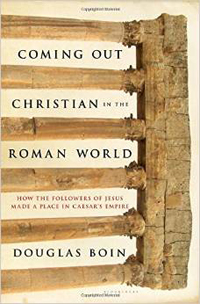 Douglas Boin, Coming Out Christian; How the Followers of Jesus Made a Place in Caesar's Empire (New York: Bloomsbury Press, 2015), 206pp.
Douglas Boin, Coming Out Christian; How the Followers of Jesus Made a Place in Caesar's Empire (New York: Bloomsbury Press, 2015), 206pp.
When Christianity was legalized in the year A.D. 313, believers comprised about 5-10% of the Roman Empire's population of some 60 million people. A hundred years later, one scholar estimates that they accounted for only 3% of the population (pp. 2, 141). How did this minority movement accomplish that?
Edward Gibbon said their success was based upon their "intolerant zeal" of Roman ways. That is, the new faith was utterly incompatible with and "obstinately different" from the old ways of the ancient empire. This trope was an undeserved stigma, says Boin. Others suggest that it was the "inherent appeal" of the Christian message in a spiritually bankrupt empire.
Douglas Boin, a classicist, historian, and archaeologist at St. Louis University, rejects this black-and-white binary way of thinking, and offers instead a more nuanced interpretation. In his view, there were many, different ways to be both Roman and Christian. He argues that the early believers lived hyphenated lives and "juggled their identities in highly creative ways." They lived in a middle ground characterized by many shades of gray.
For the most part, early believers were just ignored, even "entirely invisible" when judged by their archaeological remains. New scholarship suggests that they weren't as persecuted as some standard histories suggest. In addition to confessing their faith, believers served in the military, went to the games, enjoyed the festivals, and attended the theaters, just like their neighbors. For them, Rome wasn't the whore of Babylon but a fascinating place to live. In short, they did their best to fit in with "shared civic values," which is just what we read in the epistles — wives were to obey their husbands, slaves their masters, and all believers were to "honor the emperor."
Boin discerns a pattern not of hostility and withdrawal, not some zero sum game, but one of engagement and dialogue. Christian success was not "dependent on someone else's conversion. It was dependent on conversation." By the late fourth century, though, this civic tolerance by Christians had eroded into violent cultural clashes — the burning of a synagogue, the destruction of a pagan temple, and government legislation that punished non-believers. We've been living with the sad consequences ever since.


